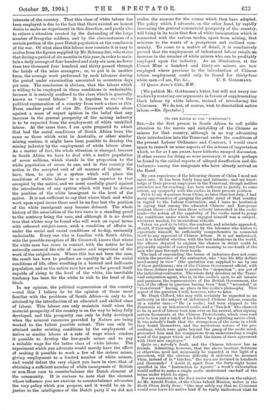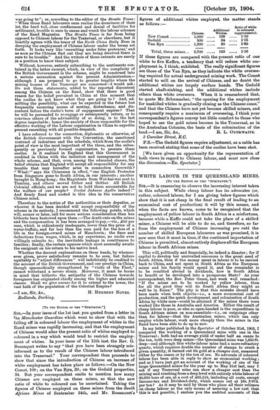SIR, — As the first person in South Africa to call public
attention to the merits and suitability of the Chinese as miners for that country, although in no way advocating their introduction into the Transvaal under the conditions of the present Labour Ordinance and Contract, I would crave apace to remark on some aspects of the scheme of importation which, so far as I am aware, have hitherto escaped discussion. If other excuse for doing so were necessary, it might perhaps be found in the cabled reports of alleged disaffection and dis- turbances among the emigrants who have already arrived on My own experience of the labouring classes of China I need not enter into. It has been fairly long and intimate ; and my know- ledge of their present employers in the Transvaal, though neither extensive nor far-reaching, has been sufficient to justify, to some extent, my sympathy with the coolies in their present position.
Prior to my departure from China, no later than last July, I had many opportunities of gauging the public mind of that country in regard to the Labour Convention, and I have no hesitation in saying that among the educated Chinese and Europeans resident there—other than those actively interested in the coolie trade—the notion of the capability of the coolie mind to grasp the conditions under which he engaged himself was a subject, whenever mooted, for incredulous ridicule.
Taken an pied de la lettre, the contract, and schedule appended, should, if thoroughly understood by the labourer who wishes to expatriate himself, be sufficiently comprehensive to commend itself to any opponent of Chinese labour. It is not understood, and it is doubtful whether, with the best intentions in the world, the officers deputed to explain the clauses in detail could be physically capable of conveying their meaning to one-tenth of the men who pass through their hands.
The task of expounding the terms of indenture does not come within the province of the contractor, who " has his fifty dollars head-money in view" (the quotation was supplied to me by one of these gentlemen) ; nor of the Chinese Government official, with his three dollars per man to receive for " inspection "; nor yet of the individual contractor. The whole duty devolves on the Trans- vaal emigration agent, who is, in the coolie's eyes, to all intents and purposes, the representative of the British Government, the fact of the officer in question having been "lent," "seconded," or " transferred " having no place in the coolie's philosophy. This aspect of the question I will, however, refer to later.
Mr. Hugh Clifford, who may with certainty be regarded as an authority on the subject of indentured Chinese labour, remarks on a similar case:—" He [a coolie] had been shipped to the Peninsula as an indentured coolie, and a Tau-keh ' who chanced to be in need of labour took him over on his arrival, after signing certain documents at the Chinese Protectorate, which were read over to him and a batch of his fellows by a gabbling native clerk. It was nobody's fault that the strangeness of the scene in which they found themselves, and the mysterious nature of the pro- ceedings, which were quite beyond the grasp of the coolie mind, prevented him and his companions from understanding a single word of the papers which set forth the terms of their agreement with their new employer." Quite so ; nobody's fault, and the Chinese labourer has no friends. Admitting, however, that the above incident, fictitious or otherwise, need not necessarily be regarded in the light of a precedent, will the obvious difficulty it indicates be lessened when, instead of in "batches," the men are lectured in hundreds and thousands ? I doubt if, apart from the forty-eight hours specified in the " Instruction to Agents," a week's exhortation would suffice to make a single coolie understand one-half of the terms under which he signs.
Nor are residents in the East under any illusion on the subject. As Mr. Arnold Foster, of the China Inland Mission, writes in the North China Daily News : "One may safely say that no Chinaman would ever leave his native land if he really understood what he
lot, the hard toil, close confinement and denial of facilities for settlement, trouble is sure to ensue and wreck the labour schemes of the Rand Magnates. The Straits Times is far from being opposed to Chinese labour for the Transvaal, or elsewhere, but it heartily agrees with the tenor of the North China Daily News in decrying the employment of Chinese labour under the terms set
forth. It looks very like recruiting under false pretences,' and as soon as the Chinese find out they are being deceived there is sure to be trouble." And the writers of these extracts are surely in a position to know their subject.
Without, however, entirely subscribing to the sentiments con- tained in the latter excerpt, which, in view of the complicity of the British Government in the scheme, might be construed into
a serious accusation against the present Administration— although I am prepared to go to greater lengths where the mining houses of the Transvaal are concerned—I would ask :
Do not these statements, added to the reported discontent among the Chinese on the Rand, show that there is good reason for the belief prevalent in China at this moment that the coolies do not know what they are going to ? And, ad- mitting the possibility, what can be expected in the future but frequently recurring scenes of mutiny, disturbance, and dis- content before the coolie's term of engagement expires ? That he will be persuaded to re-engage or subsequently return, or to convince others of the advisability of so doing, is to the last degree improbable ; hence the anxiety of those responsible for the effective working of the Labour organisation in China to expedite present recruiting with all possible despatch.
I have referred to the connection, diplomatic or otherwise, of the British Government with the Convention, the sanctioned contract of indenture and the schedule, which from the coolie's point of view is the most important of the three, and the subse- quently or previously formed organisation to procure these coolies. Is it realised in England that this Government is credited in China with the initiation and management of the whole scheme, and that, even among the educated classes, the belief obtains that England will accept all responsibility for any trouble that may hereafter arise in connection therewith ?
" What !" says the Chinaman in effect, "one English Protector from Singapore gone to South Africa, in our interests ; another brought to Hong-kong ; the Magistrate from Wei-hai-wei sent to Tientsin, and others moved hither and thither. All British Colonial officials, and we are not to hold them accountable for the welfare of our people ? Credat Judaeus Apella indeed !" And firmly fixed and rooted is this idea in the conservative Chinese mind.
Therefore to the notice of the authorities or their deputies, or whoever it has been decided will accept responsibility of the scheme in its entirety, I recommend the following points, which will, sooner or later, call for more serious consideration than has hitherto been bestowed upon them :—The death-rate on the mines and the compensation it has been arranged to pay,—viz., 410 per man, which is ridiculously inadequate, lower than the price of a water-buffalo, and far less than the sum paid for the loss of a life in the foreign-owned mines of Manchuria ; the fines and deductions from wages, which, in my experience, no coolie ever willingly submits to ; the inevitable leakage in remittances to families ; finally, the certain squeeze which most assuredly awaits the emigrant on his return to his native Land.
Whether the decreed explanations on these heads, by whomso- ever given, prove satisfactory remains to be seen, but failure equitably to "adjust differences" will indubitably be credited to the account of the British Government, and our prestige in China, though spasmodically strengthened by "visits of the Fleet," cannot withstand a severe strain. Moreover, it must be borne in mind that hitherto the antipathy of the Chinese towards foreigners has originated chiefly among the higher and educated classes. Shall we give excuse for it to extend to the lower, the vast bulk of the population of the Celestial Empire ?
—I am, Sir, &c., H. HERBERT NOYES.
.Redlands, Dorking.



















































 Previous page
Previous page